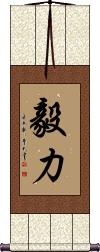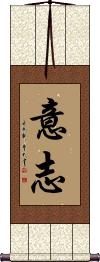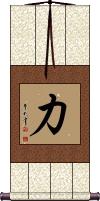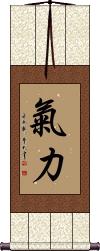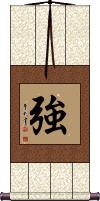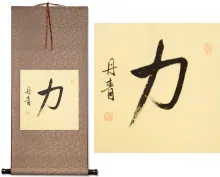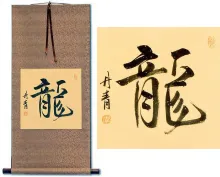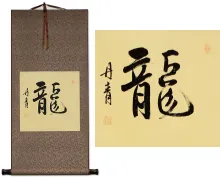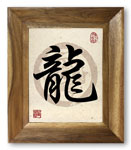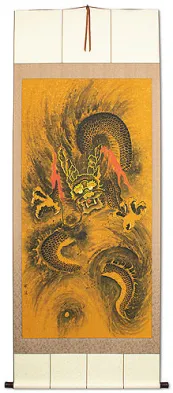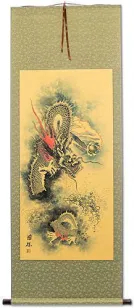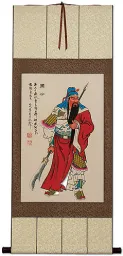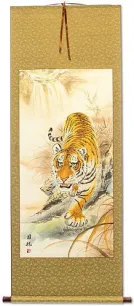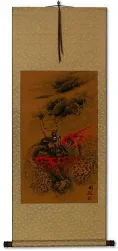Many custom options...
And formats...

Power Strength in Chinese / Japanese...
Buy a Power Strength calligraphy wall scroll here!
Personalize your custom “Power Strength” project by clicking the button next to your favorite “Power Strength” title below...
Will-Power / Self-Control
意志力 is a form of willpower or self-control and is about having the determination or tenacity to keep going.
In Japanese, this is the power of will, the strength of will, volition, intention, intent, or determination.
Perseverance / Will-Power
毅力 is a way to express “perseverance” with the idea of “willpower” in Chinese and old Korean Hanja. It can also mean “strong-willed.”
The first character means “strong” and “persistent,” while the second means “strength” and “power.”
Determination to Achieve / Will-Power
意志 is a Chinese, Korean, and Japanese word that means “determination to achieve.” It can also be translated as: will; willpower; determination; volition; intention; or intent.
In Japanese, this can also be the given name, Ishi.
Power / Strength
力 is the simplest form of “power” or “strength.”
In Japanese, it is pronounced “chikara” when used alone, and “ryoku” when used in a sentence (there are also a few other possible pronunciations of this Kanji in Japanese).
In some contexts, this can mean ability, force, physical strength, capability, and influence.
Strong Hearted / Strong Willed
意志堅強 can mean either “strong-hearted,” “strong-willed” or “determination.”
The first two characters can be translated as “will,” “willpower,” “determination,” “volition,” “intention,” or “intent.” But, it should be noted that this first part possesses the element of “heart” in the lower portion of both characters (they also partially carry the meaning “with the whole heart”).
The last two characters mean “strong” or “staunch.”
Chinese word order and grammar are a bit different than English, so in this case, they are in reverse order of English but have the correct meaning in a natural form.
See Also: Strong Willed | Discipline | Will-Power
Strength / Vigor / Energy
Physical Strength
氣力 can mean any of the words in the title above, and in some contexts, can also mean effort, will-power, or talent.
This refers mostly to physical strength (as opposed to mental or spiritual).
![]() In modern Japan, they use a simplified first character for this word. If you want to order this title with that special Japanese version, click on the character to the right instead of the button above.
In modern Japan, they use a simplified first character for this word. If you want to order this title with that special Japanese version, click on the character to the right instead of the button above.
Strong / Powerful / Force
強 is a character that means strong, strength, force, powerful, better, stubborn, and stiff (yes, all of this in one character).
This “strong” has less to do with physical strength and more to do with having a winning attitude, or just having the ability to win at something.
Note that most of the time, this character is pronounced “qiang” but when used with the meaning of stubborn, unyielding, or stiff, it is pronounced “jiang” in Chinese.
Also, sometimes “qiang” is used in modern Chinese to describe people that do crazy things (For example: Bicycling from Beijing to Tibet alone). I sometimes can be found outside my Beijing apartment wearing nothing but shorts and a tee-shirt while eating ice cream during a snow storm, just to hear my neighbors call me “qiang.” Maybe they mean “strong” but perhaps they are using the new meaning of “crazy strong.”
強 can also be a Chinese surname that romanizes as Jiang in the mainland or Chiang if from Taiwan.
強 is a valid Korean Hanja character with the same meaning but is mostly used in compound Korean words.
強 is used in Japanese (though normally in compound words). In Japanese, it has the same meaning but in some contexts can mean “a little more than...” or “a little over [some amount].” Most Japanese would read this as tough, strength, stiff, hard, inflexible, obstinate, or stubborn.
The variant 彊 is sometimes seen in older literature.
This in-stock artwork might be what you are looking for, and ships right away...
Gallery Price: $65.00
Your Price: $39.77
Gallery Price: $60.00
Your Price: $36.88
Gallery Price: $65.00
Your Price: $39.88
Gallery Price: $65.00
Your Price: $39.88
Starting at: $28.88
Gallery Price: $108.00
Your Price: $59.88
Gallery Price: $240.00
Your Price: $138.88
Gallery Price: $240.00
Your Price: $148.88
Gallery Price: $240.00
Your Price: $138.88
Not the results for Power Strength that you were looking for?
Below are some entries from our dictionary that may match your Power Strength search...
| Characters If shown, 2nd row is Simp. Chinese |
Pronunciation Romanization |
Simple Dictionary Definition |
力 see styles |
lì li4 li riki りき |
More info & calligraphy: Power / Strength(suffix) strength; power; proficiency; ability; (given name) Riki bala; power, strength, of which there are several categories: 二力 power of choice and of practice; 三力 the power of Buddha; of meditation (samādhi) and of practice. 五力 pañcabala, the five powers of faith, zeal, memory (or remembering), meditation, and wisdom. 六力 A child's power is in crying; a woman's in resentment; a king's in domineering; an arhat's in zeal (or progress); a Buddha's in mercy; and a bhikṣu's in endurance (of despite) . 十力 q.v. The ten powers of Buddhas and bodhisattvas. |
体力 see styles |
tairyoku たいりょく |
More info & calligraphy: Physical Strength |
力量 see styles |
lì liang li4 liang5 li liang rikiryou / rikiryo りきりょう |
More info & calligraphy: Strength / Ability(1) ability; capacity; capability; talent; (2) physical strength |
大力 see styles |
dà lì da4 li4 ta li dairiki だいりき |
More info & calligraphy: Great Power(noun - becomes adjective with の) immense physical strength; (p,s,g) Dairiki great power or energy |
自力 see styles |
zì lì zi4 li4 tzu li jiriki じりき |
More info & calligraphy: Power of Oneself / Self-Sufficientself-power |
體力 体力 see styles |
tǐ lì ti3 li4 t`i li ti li |
More info & calligraphy: Physical StrengthSee: 体力 |
自 see styles |
zì zi4 tzu mizu みず |
(bound form) self; oneself; from; since; naturally; as a matter of course (prefix) (1) self-; (prefix) (2) (See 至) from (a time or place); (female given name) Mizu sva, svayam; the self, one' s own, personal; of itself, naturally, of course; also, from (i. e. from the self as central). 自 is used as the opposite of 他 another, other's, etc., e. g. 自力 (in) one's own strength as contrasted with 他力 the strength of another, especially in the power to save of a Buddha or Bodhisattva. It is also used in the sense of ātman 阿怛摩 the self, or the soul. |
二力 see styles |
èr lì er4 li4 erh li nika にか |
(female given name) Nika Dual powers; there are three definitions: (1) 自力 one's own strength, or endeavours, i.e. salvation by cultivating 戒, 定, and 慧; 他カ another's strength, e.g. the saving power of Amitābha. (2) 思擇力 Power of thought in choosing (right principles); 修習力 power of practice and performance. (3) 有力 and 無力 positive and negative forces: dominant and subordinate; active and inert energy. |
人力 see styles |
rén lì ren2 li4 jen li jinriki; jinryoku じんりき; じんりょく |
manpower; labor power human power; human strength; human effort; human agency |
他力 see styles |
tā lì ta1 li4 t`a li ta li tariki たりき |
(1) outside help; help from without; (2) {Buddh} salvation by faith; (surname) Tariki Another's strength, especially that of a Buddha, or bodhisattva, obtained through faith in Mahāyāna salvation. |
余力 see styles |
yoriki よりき |
(1) remaining strength; surplus energy; reserve power; (2) money to spare; (surname) Yoriki |
全力 see styles |
quán lì quan2 li4 ch`üan li chüan li zenryoku ぜんりょく |
with all one's strength; full strength; all-out (effort); fully (support) (noun - becomes adjective with の) all one's power (strength, energy, efforts); one's utmost |
力道 see styles |
lì dào li4 dao4 li tao rikidou / rikido りきどう |
strength; power; efficacy (male given name) Rikidō |
加力 see styles |
jiā lì jia1 li4 chia li kariki |
Added strength or power (by the Buddhas or bodhisattvas); aid. |
加持 see styles |
jiā chí jia1 chi2 chia ch`ih chia chih kaji かじ |
(Buddhism) (from Sanskrit "adhiṣṭhāna") blessings; (fig.) empowerment; boost; support; backing; to give one's blessing; to empower; (Tw) to hold an additional (passport etc) (n,vs,vi) (1) prayer (to get rid of misfortune, disease, etc.); incantation; faith healing; (n,vs,vi) (2) {Buddh} adhisthana (blessing of a buddha or bodhisattva); (place-name, surname) Kamochi 地瑟娓曩 adhiṣṭhāna, to depend upon, a base, rule. It is defined as dependence on the Buddha, who 加 confers his strength on all (who seek it), and 持 upholds them; hence it implies prayer, because of obtaining the Buddha's power and transferring it to others; in general it is to aid, support. |
勁力 劲力 see styles |
jìn lì jin4 li4 chin li |
physical strength; power |
勢力 势力 see styles |
shì li shi4 li5 shih li seiriki / seriki せいりき |
power; influence; a force (military, political etc) influence; power; might; strength; potency; force; energy; (place-name, surname) Seiriki momentum |
婆羅 婆罗 see styles |
pó luó po2 luo2 p`o lo po lo bara |
pāla; keeper, guardian, warden; vihārapāla, warden of a monastery. bala; power, strength, especially the 五力 five powers, pañca bālani, i.e. 五根; also the 十力 daśabala, ten powers. Name of the sister of Ānanda who offered milk to Śākyamuni. bāla; 'young,' 'immature,' 'simpleton, fool,' 'hair' (M.W.); ignorant, unenlightened, see bālapṛthagjana, below. |
強さ see styles |
tsuyosa つよさ |
strength; power |
戦力 see styles |
senryoku せんりょく |
(1) war potential; military strength; fighting power; (2) ability (to compete); capabilities; valuable asset |
戰力 战力 see styles |
zhàn lì zhan4 li4 chan li |
military strength; military power; military capability |
敵勢 see styles |
tekisei; tekizei / tekise; tekize てきせい; てきぜい |
enemy's strength or fighting power |
法力 see styles |
fǎ lì fa3 li4 fa li houriki / horiki ほうりき |
magic power power of Buddhism; (place-name, surname) Houriki The power of Buddha-truth to do away with calamity and subdue evil. |
眼力 see styles |
yǎn lì yan3 li4 yen li ganriki; ganryoku がんりき; がんりょく |
eyesight; strength of vision; the ability to make discerning judgments insight; power of observation insight |
筆力 笔力 see styles |
bǐ lì bi3 li4 pi li hitsuryoku ひつりょく |
vigor of strokes in calligraphy or drawing; vigor of style in literary composition strength of the brush stroke; power of the pen; ability to write |
ばか力 see styles |
bakajikara ばかぢから |
great physical power; animal strength |
他力宗 see styles |
tā lì zōng ta1 li4 zong1 t`a li tsung ta li tsung tariki shū |
Those who trust to salvation by faith, contrasted with 自力宗 those who seek salvation by works, or by their own strength. |
咀嚼力 see styles |
soshakuryoku そしゃくりょく |
chewing power; chewing strength; bite strength; masticatory strength; strength of mastication |
営業力 see styles |
eigyouryoku / egyoryoku えいぎょうりょく |
sales skills; marketing power; sales strength; sales expertise |
強力さ see styles |
kyouryokusa / kyoryokusa きょうりょくさ |
power; strength |
Click here for more Power Strength results from our dictionary
The following table may be helpful for those studying Chinese or Japanese...
| Title | Characters | Romaji (Romanized Japanese) | Various forms of Romanized Chinese | |
| Will-Power Self-Control | 意志力 | ishi ryoku / ishiryoku | yì zhì lì yi4 zhi4 li4 yi zhi li yizhili | i chih li ichihli |
| Perseverance Will-Power | 毅力 | yì lì / yi4 li4 / yi li / yili | i li / ili | |
| Determination to Achieve Will-Power | 意志 | ishi | yì zhì / yi4 zhi4 / yi zhi / yizhi | i chih / ichih |
| Power Strength | 力 | chikara / ryoku | lì / li4 / li | |
| Strong Hearted Strong Willed | 意志堅強 意志坚强 | yì zhì jiān qiáng yi4 zhi4 jian1 qiang2 yi zhi jian qiang yizhijianqiang | i chih chien ch`iang ichihchienchiang i chih chien chiang |
|
| Strength Vigor Energy | 氣力 气力 / 気力 | kiryoku | qì lì / qi4 li4 / qi li / qili | ch`i li / chili / chi li |
| Strong Powerful Force | 強 强 | kyou / kyo | qiáng / qiang2 / qiang | ch`iang / chiang |
| In some entries above you will see that characters have different versions above and below a line. In these cases, the characters above the line are Traditional Chinese, while the ones below are Simplified Chinese. | ||||
Successful Chinese Character and Japanese Kanji calligraphy searches within the last few hours...

